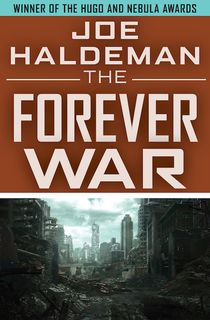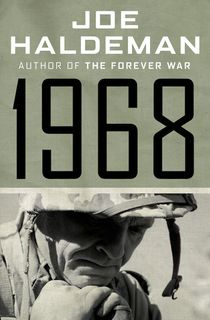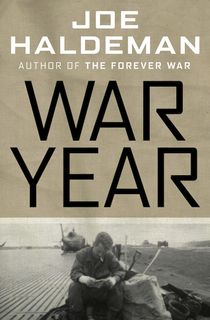I knew I wanted to be a writer well before I was drafted, and when that almost inevitable axe fell in 1967, I decided one way to make the most of it was to use my one-year sentence in Vietnam as a writing challenge: I would write at least one page every day, and hope that after 366 days I would have enough material for a novel.
In fact, several novels came from that year, in various degrees of remove. War Year was almost strictly autobiography, much of it lifted straight out of letters I wrote home from Vietnam. The Forever War was also autobiography, refracted through the lens of science fiction.
1968 was a postmodern reworking of the same autobiographical material; both Tool of the Trade and Forever Peace were largely the ruminations of a middle-aged man reflecting on the memories of wartime; and, Work Done for Hire is about post-traumatic stress disorder—all of the books in one way or another centered on what happened to me during that one terrible year.
From the settled and perhaps rueful perch of a septuagenarian writer, looking back a half-century into the very unsettled sixties, a couple of questions do now beg to be answered:
Would you have been a writer without the experience of Vietnam? What else might you have done?
I think I would have been a writer of some sort, since I'd started scribbling stories and cartoons and poems when I was about ten. I had no encouragement except from my mother, but she liked them well enough to bind them into little books with her sewing machine. (They would be around now as embarrassing juvenilia, but my father, a neatness freak, found them and burned them.)
But the long habit of writing, to paraphrase a title I would later use, was well entrenched long before I was drafted and sent off to save America from the Communist Menace. I didn't think of it at the time, but without the war I wouldn't have much to write about: it gave me a consistent subject and point of view for one remembered year—and the timeless theme of one man's survival in a hostile universe.
But if I hadn't been caught in that cold draft, my plans for life had nothing to do with the military.
I suppose I would always write, but if I hadn't had early success there, I could have followed other avenues. I graduated from university with a degree in physics and astronomy, and even had landed a very junior job as an astronomer, running a small observatory in Chile (with one telescope, smaller than the one I have in my bedroom now). But that astronomy job was with the Navy, and of course they wanted me to get the draft board off my case first.

Author Joe Haldeman
Photo Credit: AlchetronI followed their advice and applied to be a Scientific Assistant in the Army, which a friendly guy with lots of stripes on his shoulders assured me would mean safely cleaning test tubes stateside. The truth that no one mentioned—perhaps because it was obvious to anyone of normal intelligence—was that in time of war the first assignment anyone gets is combat. Then you can go clean test tubes, if you're still alive. The guy with the stripes got $15 for roping me in.
So I spent one year as a combat engineer in the Central Highlands of Vietnam, in fairly heavy combat for the first six months. Wounded, I then spent the rest of the year, plus one leap-year day, in various hospitals.
The guys around me in combat and in the hospital were mostly fellow draftees, only staying in the army long enough to get out. I was older than all of them, having wasted six years learning about stars and stuff, and to them was a very strange bird indeed. How could I be married four years and not have any children, for instance, they wondered? All the other married men had been trapped by paternity. (Their attitude toward birth control was a curious amalgam of ignorance and machismo—you couldn't really avoid having children if you were a real man, they thought.)
The other men and boys were more or less respectful of my advanced years and curious amount of education. Many of them were functionally illiterate, and I was glad to help them write letters home and fill out forms.
My wife and I had encountered science fiction fandom before I was drafted, and contact with other SF fans helped me hang onto my sanity in Vietnam. I wrote "war columns" for fanzines like Tapeworm and Odd, and occasional poetry, though I didn't try to write any war-related fiction until I was out of the army.
The easy and non-judgmental camaraderie of science fiction fandom also eased me through the transition back into civilian life, once the military was done with me. I wasn't looking for a job, but as must often happen, the perfect job reached out and caught me.
This post is sponsored by Open Road Media. Thank you for supporting our partners, who make it possible for The Archive to continue publishing the history stories you love.
Featured photo of Joe Haldeman during the Vietnam War: Open Road Media
KEEP SCROLLING FOR MORE HISTORY STORIES



